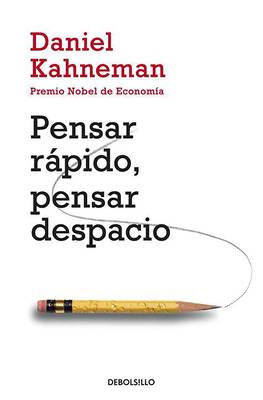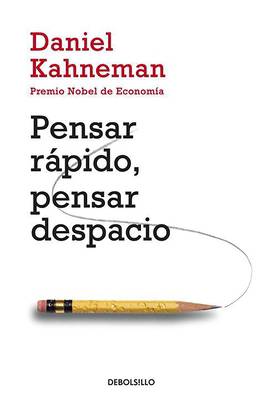
- Retrait gratuit dans votre magasin Club
- 7.000.000 titres dans notre catalogue
- Payer en toute sécurité
- Toujours un magasin près de chez vous
- Retrait gratuit dans votre magasin Club
- 7.000.0000 titres dans notre catalogue
- Payer en toute sécurité
- Toujours un magasin près de chez vous
Description
Un apasionante recorrido por el funcionamiento de la mente de la mano del padre de la psicología conductista y premio Nobel de Economía en 2002: Daniel Kahneman.
Daniel Kahneman, uno de los pensadores más importantes del mundo, recibió el premio Nobel de Economía por su trabajo pionero en psicología sobre el modelo racional de la toma de decisiones. Sus ideas han tenido un profundo impacto en campos tan diversos como la economía, la medicina o la política, pero hasta ahora no había reunido la obra de su vida en un libro. En Pensar rápido, pensar despacio, un éxito internacional, Kahneman nos ofrece una revolucionaria perspectiva del cerebro y explica los dos sistemas que modelan cómo pensamos. El sistema 1 es rápido, intuitivo y emocional, mientras que el sistema 2 es más lento, deliberativo y lógico. Kahneman expone la extraordinaria capacidad (y también los errores y los sesgos) del pensamiento rápido, y revela la duradera influencia de las impresiones intuitivas sobre nuestro pensamiento y nuestra conducta. El impacto de la aversión a la pérdida y el exceso de confianza en las estrategias empresariales, la dificultad de predecir lo que nos hará felices en el futuro, el reto de enmarcar adecuadamente los riesgos en el trabajo y en el hogar, el profundo efecto de los sesgos cognitivos sobre todo lo que hacemos, desde jugar en la Bolsa hasta planificar las vacaciones; todo esto solo puede ser comprendido si entendemos el funcionamiento conjunto de los dos sistemas a la hora de formular nuestros juicios y decisiones. Al implicar al lector en una animada reflexión sobre cómo pensamos, Kahneman consigue revelar cuándo podemos confiar en nuestras intuiciones y cuándo no, y de qué modo podemos aprovechar los beneficios del pensamiento lento. Además, ofrece enseñanzas prácticas e iluminadoras sobre cómo se adoptan decisiones en la vida profesional o personal, y sobre cómo podemos usardistintas técnicas para protegernos de los fallos mentales que nos crean problemas. Pensar rápido, pensar despacio cambiará para siempre nuestra manera de pensar sobre cómo pensamos. Reseñas:
«Los más entusiastas lo comparan con Galileo y Darwin.» - El Mundo
«Considerado uno de los mejores libros de 2011 por The New York Times, The Economist o The Wall Street Journal, Kahneman revela cuándo debemos confiar en nuestras intuiciones para aprovechar los beneficios del pensamiento lento.» - El Economista
ENGLISH DESCRIPTION Major New York Times bestseller
Winner of the National Academy of Sciences Best Book Award in 2012
Selected by the New York Times Book Review as one of the ten best books of 2011
A Globe and Mail Best Books of the Year 2011 Title
One of The Economist's 2011 Books of the Year
One of The Wall Street Journal's Best Nonfiction Books of the Year 2011
2013 Presidential Medal of Freedom Recipient
Kahneman's work with Amos Tversky is the subject of Michael Lewis's The Undoing Project: A Friendship That Changed Our Minds
In the international bestseller, Thinking, Fast and Slow, Daniel Kahneman, the renowned psychologist and winner of the Nobel Prize in Economics, takes us on a groundbreaking tour of the mind and explains the two systems that drive the way we think. System 1 is fast, intuitive, and emotional; System 2 is slower, more deliberative, and more logical. The impact of overconfidence on corporate strategies, the difficulties of predicting what will make us happy in the future, the profound effect of cognitive biases on everything from playing the stock market to planning our next vacation―each of these can be understood only by knowing how the two systems shape our judgments and decisions.
Engaging the reader in a lively conversation about how we think, Kahneman reveals where we can and cannot trust our intuitions and how we can tap into the benefits of slow thinking. He offers practical and enlightening insights into how choices are made in both our business and our personal lives―and how we can use different techniques to guard against the mental glitches that often get us into trouble. Winner of the National Academy of Sciences Best Book Award and the Los Angeles Times Book Prize and selected by The New York Times Book Review as one of the ten best books of 2011, Thinking, Fast and Slow is destined to be a classic.
Daniel Kahneman, uno de los pensadores más importantes del mundo, recibió el premio Nobel de Economía por su trabajo pionero en psicología sobre el modelo racional de la toma de decisiones. Sus ideas han tenido un profundo impacto en campos tan diversos como la economía, la medicina o la política, pero hasta ahora no había reunido la obra de su vida en un libro. En Pensar rápido, pensar despacio, un éxito internacional, Kahneman nos ofrece una revolucionaria perspectiva del cerebro y explica los dos sistemas que modelan cómo pensamos. El sistema 1 es rápido, intuitivo y emocional, mientras que el sistema 2 es más lento, deliberativo y lógico. Kahneman expone la extraordinaria capacidad (y también los errores y los sesgos) del pensamiento rápido, y revela la duradera influencia de las impresiones intuitivas sobre nuestro pensamiento y nuestra conducta. El impacto de la aversión a la pérdida y el exceso de confianza en las estrategias empresariales, la dificultad de predecir lo que nos hará felices en el futuro, el reto de enmarcar adecuadamente los riesgos en el trabajo y en el hogar, el profundo efecto de los sesgos cognitivos sobre todo lo que hacemos, desde jugar en la Bolsa hasta planificar las vacaciones; todo esto solo puede ser comprendido si entendemos el funcionamiento conjunto de los dos sistemas a la hora de formular nuestros juicios y decisiones. Al implicar al lector en una animada reflexión sobre cómo pensamos, Kahneman consigue revelar cuándo podemos confiar en nuestras intuiciones y cuándo no, y de qué modo podemos aprovechar los beneficios del pensamiento lento. Además, ofrece enseñanzas prácticas e iluminadoras sobre cómo se adoptan decisiones en la vida profesional o personal, y sobre cómo podemos usardistintas técnicas para protegernos de los fallos mentales que nos crean problemas. Pensar rápido, pensar despacio cambiará para siempre nuestra manera de pensar sobre cómo pensamos. Reseñas:
«Los más entusiastas lo comparan con Galileo y Darwin.» - El Mundo
«Considerado uno de los mejores libros de 2011 por The New York Times, The Economist o The Wall Street Journal, Kahneman revela cuándo debemos confiar en nuestras intuiciones para aprovechar los beneficios del pensamiento lento.» - El Economista
ENGLISH DESCRIPTION Major New York Times bestseller
Winner of the National Academy of Sciences Best Book Award in 2012
Selected by the New York Times Book Review as one of the ten best books of 2011
A Globe and Mail Best Books of the Year 2011 Title
One of The Economist's 2011 Books of the Year
One of The Wall Street Journal's Best Nonfiction Books of the Year 2011
2013 Presidential Medal of Freedom Recipient
Kahneman's work with Amos Tversky is the subject of Michael Lewis's The Undoing Project: A Friendship That Changed Our Minds
In the international bestseller, Thinking, Fast and Slow, Daniel Kahneman, the renowned psychologist and winner of the Nobel Prize in Economics, takes us on a groundbreaking tour of the mind and explains the two systems that drive the way we think. System 1 is fast, intuitive, and emotional; System 2 is slower, more deliberative, and more logical. The impact of overconfidence on corporate strategies, the difficulties of predicting what will make us happy in the future, the profound effect of cognitive biases on everything from playing the stock market to planning our next vacation―each of these can be understood only by knowing how the two systems shape our judgments and decisions.
Engaging the reader in a lively conversation about how we think, Kahneman reveals where we can and cannot trust our intuitions and how we can tap into the benefits of slow thinking. He offers practical and enlightening insights into how choices are made in both our business and our personal lives―and how we can use different techniques to guard against the mental glitches that often get us into trouble. Winner of the National Academy of Sciences Best Book Award and the Los Angeles Times Book Prize and selected by The New York Times Book Review as one of the ten best books of 2011, Thinking, Fast and Slow is destined to be a classic.
Spécifications
Parties prenantes
- Auteur(s) :
- Traducteur(s):
- Editeur:
Contenu
- Nombre de pages :
- 672
- Langue:
- Espagnol
- Collection :
- Tome:
- n° 320
Caractéristiques
- EAN:
- 9788490322505
- Date de parution :
- 01-05-13
- Format:
- Livre broché
- Format numérique:
- Trade paperback (VS)
- Dimensions :
- 125 mm x 190 mm
- Poids :
- 490 g

Les avis
Nous publions uniquement les avis qui respectent les conditions requises. Consultez nos conditions pour les avis.






